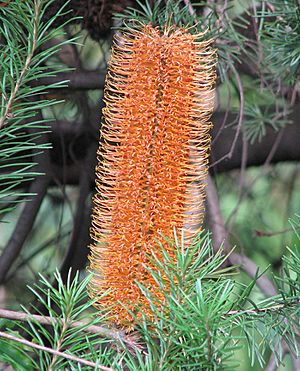Banksia 'Giant Candles' facts for kids
Quick facts for kids Banksia 'Giant Candles' |
|
|---|---|
 |
|
| Hybrid parentage | Banksia ericifolia × B. spinulosa var. cunninghamii |
| Cultivar | 'Giant Candles' |
| Origin | Sylvia E Peach, Sunnybank Hills, Queensland, 1979 |
Banksia 'Giant Candles' is a special type of Banksia plant. It's a "cultivar," which means it was created by people. This plant is a mix of two other banksias: the B. ericifolia (also called heath-leaved banksia) and B. spinulosa var. cunninghamii. It was first grown in 1979 by Sylvia E Peach in Queensland, Australia.
Contents
What It Looks Like
This amazing plant grows like a large bush. It can reach up to 5 meters (about 16 feet) tall and just as wide. It's famous for its super long flower spikes. These spikes can easily grow to 40 centimeters (about 16 inches) long! Sometimes, these heavy flowers might droop or bend.
Flower Colors and Growing Season
The flowers of 'Giant Candles' are a beautiful bronzy-orange color. They put on a show from late autumn all through winter. This makes them a great plant for gardens, especially when other plants aren't flowering.
Where and How It Grows Best
'Giant Candles' likes to grow in most types of soil, as long as the soil drains water well. This means water doesn't sit around the roots. For the best flowers, it needs lots of sunshine.
Growth Speed
In a perfect spot, this banksia can grow very fast. It can grow up to 800 millimeters (about 31 inches) in height each year! If it doesn't get much water, it won't grow as bushy. But it will still provide some shade with its green leaves all year round.
Plant Care Tips
Russell Costin, who helped register this plant, says it's becoming popular again. If you notice the leaves turning yellow, it might need more iron. You can help it by adding special plant food called iron chelate or iron sulfate. This gives the plant the iron it needs to stay healthy and green.
Related Plants
Banksia 'Yellow Wing' is another special banksia plant. It was created using 'Giant Candles' and another type called Banksia spinulosa var. collina.
 | Emma Amos |
 | Edward Mitchell Bannister |
 | Larry D. Alexander |
 | Ernie Barnes |

